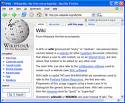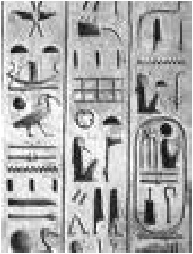
















NEXT
BACK
NEXT
BACK








Site Search
Originally a theory of communication devised by an engineer to quantify the invisible data transmitted through a wire or radio signal. Now it refers generally to understanding any system or collection of things that display the traits of Organization : order, pattern, function, purpose, inter-
The intent of a communication is not always obvious and literal. Instead must be inferred or interpreted by the receiving mind based on some knowledge of the sending mind (abstract ideas, emotions). Intention is the motive behind an act of En-
An ancient philosophical doctrine asserting that the essential substance of reality is physical matter. It was opposed to the doctrine of Idealism which claimed that abstract ideas were even more essential than solid matter. In the 19th century paradigm of science Materialism was associated with the scientific method of Reductionism.
A hypothetical unit of cultural information, analogous to the Gene as a unit of biological information. Mental packages of information, similar to bits, and bytes, and words, and symbols. Information in the form of “Memes” follows basically the same logical rules of syntax as information in the form of genes.
Memetics is a post-
Physics refers to the things we perceive with the eye of the body. Meta-
An outlook that ignores or denies the reality of supernatural entities and events. It is a humanistic philosophy based on scientific reasoning rather than faith in ancient scriptures. Usually associated with Materialism.
A system with internal cooperation and coordination between parts. Its elements are not loose and free, but bound together into an organic whole.
A worldview or belief system characteristic of an era of science, or of a particular scientific discipline.
The essential scientific method of simplifying the complexity of reality by ignoring the hard parts. Analysis breaks down big conceptual chunks into more understandable small pieces. Opposite of Holism.
A set of interacting or interdependent entities, real or abstract, forming an integrated whole. Systems Theory studies the structure and behavior of complex sets in their context.
Philosophically, substance is the essential element of a thing. Ideas are called “substantial” to the degree that they have a significant impact on material reality.
The general, philosophical understanding of a person’s situation relative to the whole world. This fundamental belief system is constructed by each individual from innate dispositions, experienced perceptions, cultural memes, and reasoned inferences to serve as a template for learning and operating within the limits of the physical and social environment. It is an internal model of reality, which frames and filters all incoming information. This mental conception is all we know of Reality.



A more extensive list of technical terminology related to the Enformationism Thesis can be found in the Intelligent Evolution Glossary appended to this site under the heading of General Information.
Other unfamiliar terms may be explored further in Wikipedia : URL: http://en.wikipedia.org/wiki/Phenomenalism



Coined terms marked with the cc symbol have been copyrighted on Creative Commons for
creative control of its meaning in this context

MY MEANING
When I use a word, it means just what I choose it to mean.
—-
UNIVERSAL LANGUAGE
. . . information might be the fundamental, immutable language of Nature.
—-
Decoding the Universe
ENFORMY
In fact, it is now believed that information may be the most basic concept in physics-
—-
The Electric Mene
DIGITAL DATA
Computers have been weak in their ability to understand and process information that contains abstractions and complex webs of relationships, but they are improving.
—-